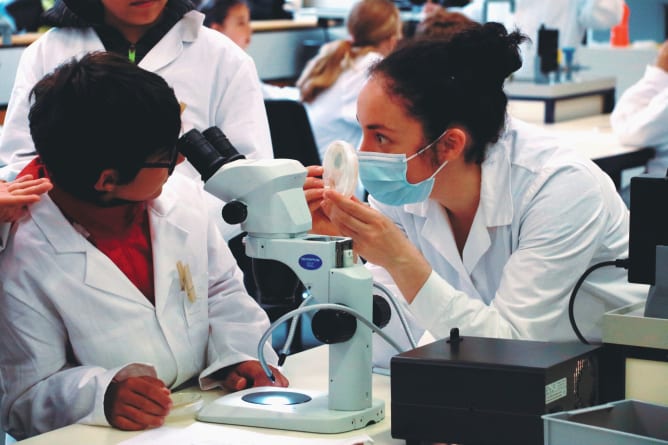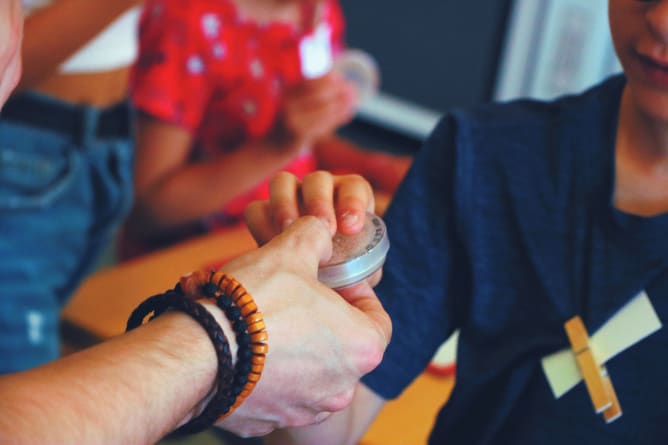In a nutshell
Microbiology has the rare ability to generate wonder in children, who discover an unsuspected miniature world. Our students have for mission to funnel this wonder through games, sport and activities that stimulates children’s creativity and observation abilities. Learning to do outreach activities and to pass knowledge acquired during their bachelor is a skill that will be essential to them, regardless of their career choices later in life.
Activities take place in various schools of the Canton of Neuchâtel, but also in our lab or in the field. They are imagined, designed and led by biology students in their last semester in the bachelor’s degree, for children aged from 5 to 15 years old. We are there to guide these students, inspire them and to make sure that the scientific content is correct, working closely with the school teachers.
This educational approach, called service-learning, relies on the direct involvement of students to apply their knowledge to societal issues. We chose to use this novel concept in microbiology outreach to raise public awareness of the «bright» (i.e., beneficial) and «dark» (i.e., harmful) sides of microorganisms.
In parallel to the activities, we communicate extensively on social media and rely on their sprawling channels to make our project and scientific knowledge shine beyond the school and academic spheres. By inviting the population to take ownership of the popularization process, we stimulate their interest and curiosity about scientific issues, in addition to triggering an enriching dialogue.
Recently, we also addressed the scientific community through an article in the journal Frontiers in Education (DOI link at the bottom of this page), in which some of the students from this year’s activities took part.
Our project has just been awarded by the Best Teaching prize from Crédit Suisse. This award crowns two years of educational innovation.

The purpose of our project
Our approach is based on two observations: on the one hand, scientific curricula focuses on notions of science communication aimed at peers (an essential aspect of the profession), neglecting aspects of science outreach. On the other hand, microbiology is either absent or superficially addressed at school. Yet, the activities we ran in 2020 and 2021 were a great success, both for the children and for the students and teachers involved. This demonstrates a real pedagogical potential, in addition to demystifying the scientific work performed at the laboratory and in the field. For the younger children, these activities make them aware of the potential dangers and benefits of microorganisms. For older children, they give them new and invaluable clues to understand the world around them.
Indeed, during the on-going pandemic, the risks of misinformation highlight the need to develop better tools to form one’s own opinion, especially on scientific topics. With such tools, everyone is better able to face the challenges that affect society.
Unfortunately, scientific knowledge is still largely confined within the walls of universities. When it flows out to the public space, it is usually in a rather vertical way, without or only with a few interactions. We want to break this barrier and adopt a more horizontal approach, with the students in the frontline as mediators.
One of the singularities of our project is that we bring together people who usually do not talk to each other or interact directly. By this we mean that the relationship between children and students is at the heart of the project. The message is spread further, when children talk to those around them, conveying key concepts through their fresh eyes. This might inspire a scientific vocation in the children participating to the program.

Why do we need your help ?
Even though our activities are supported by the University of Neuchâtel and developed within it, they go far beyond its mission and the regular framework of its academic activities. Therefore, the project needs additional funding sources to keep growing.
At present, the project is supported by the Agora program from Swiss National Science Foundation until March 2022, when the next semester of the service-learning course is due to start. We are still looking for sponsors to make the project sustainable.
We aim to democratize service-learning in the Swiss scientific landscape, first by implementing it in other research groups at the University of Neuchâtel, then in other Swiss universities, starting with the creation of turnkey methodological kits for academic tutors. Eventually, we would like to be one of the nodes of a service-learning network, to expand the program beyond microbiology and to open it up to the larger domain of biodiversity, or even beyond. We intend to translate the material generated into German, Italian and English to meet this ambition.
Next year, we will collaborate with HEP-BEJUNE (Haute École Pédagogique des cantons de Berne, du Jura et de Neuchâtel) to have a professional coaching in didactics and an institutional relay in the schools. We will also work with the RTS (Radio Télévision Suisse) to develop activities combining scientific communication and multimedia.
We have turned to crowdfunding because we believe it will help us realize our dream of maintaining our own activities over the long term. We also want to take advantage of the visibility that such a campaign offers to make us known to the public, the media and institutions. With your help, we will be able to provide at least the equivalent of one activity for half a dozen classes. This will be enough to give us a big boost until we find a stable source of funding.




